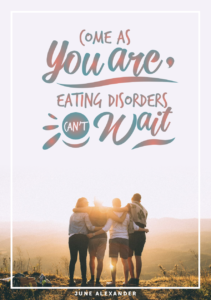Destigmatization of Eating Disorders Can’t Wait

Destigmatization of Eating Disorders Can’t Wait
Looking ‘healthy’ on the outside, Ziba Redif blamed herself for the way she felt. She took decades to understand that she was struggling with the eating disorder, bulimia nervosa. Ziba is adamant that nobody with an eating disorder should have to face suicide to realise they have a problem.
Living with an eating disorder can feel like a merciless, inescapable nightmare. For years, I told myself that “tomorrow will be different” – a promise made with such determination and sincerity that even after a decade of disordered eating I still believed it to be true. But the vicious cycle of restrict, binge and compensate continued throughout my teens and twenties, until I had no idea how to disentangle myself from the web of compulsion and obsession.
Bulimia is a subtype of an eating disorder that’s characterized by a recurring pattern of uncontrollable binge-eating followed by compensatory behaviours like fasting, purging, or excessively exercising. For me, the illness was largely perpetuated by starvation and self-deprivation, though, this isn’t part of the DSM-V diagnostic criteria. Research has shown that people struggling with bulimia display higher levels of perfectionism. In a 2010 study, Bardone-Cone and colleagues demonstrated that perfectionism forms part of the “etiology, maintenance, and treatment of eating disorders”.
I looked ‘healthy’ on the outside
Bulimia tends to be easier to hide than anorexia, as it doesn’t necessarily result in visible weight change. Throughout my illness, I looked “healthy” on the outside. I had a full-time job and a decent social life. I considered myself an achiever, yet, privately battled a turbulent relationship with food. It remained hidden for so long that I couldn’t imagine ever confessing it to anyone.
Bulimia, like any other eating disorder, is unsustainable: the physical and emotional consequences are vast and potentially life-threatening. I endured its brutality for a long time, until depression escalated to suicidal thoughts. I couldn’t bear another day doing what I was doing, but I didn’t know how to stop. What started out as a way to regain control and relieve discomfort had become an addiction that felt impossible to escape.
Luckily, reaching desperation was an opportunity to discover that help was available and that recovery was possible. It was a second chance to live a different version of life. I realised I couldn’t claw my way to wellness while living in secrecy, and that I needed support, so, I decided to enter a 12-step programme for people harbouring a dysfunctional relationship with food, including anorexia and bulimia. There are a number of 12-step programmes based on the Alcoholics Anonymous model, including Overeaters Anonymous and Eating Disorders Anonymous, which take an addiction-based approach to recovery and operate independently of outside funding.
Eating disorders exist across all cultures
A few years after pursuing recovery, I undertook a postgraduate degree in psychology and later worked as a research assistant for a prominent eating disorders service in London. I listened to eating disorder experiences similar to mine, and discovered that treatment was available via national healthcare for all different forms of the disease, including bulimia, “other specified feeding or eating disorder” (OSFED), and binge-eating disorder. Travelling and living in Asia, more recently, I’ve observed first-hand that eating-related problems exist across all cultures. Despite their ubiquity, it took me decades to understand that I was struggling with an eating disorder, and that there were others out there like me. Instead, I blamed myself, which only reinforced feelings of shame and guilt, exacerbating and prolonging my illness.
Growing up in the late nineties and early 2000s, it was common to see media coverage of underweight models and celebrities, shedding light on the issue of anorexia, but other types of disorders like bulimia or binge eating disorder were rarely addressed. Films and television programs served up trite narratives around stereotypical characters, and while sex education formed a regular part of the curriculum at school, there was little to no discussion around mental health.
Sharing the truth helps another step out of the darkness
My experience of the 12-steps was a hopeful glimpse of light at the end of the tunnel. Being part of a community of survivors not only sharing their truth but supporting one another was a tremendous step out of darkness. As a research assistant, I helped deliver a classroom-based body-image intervention in schools, educating young people about eating disorders and body dissatisfaction, and a year later a similar program was implemented in universities in Japan, which makes me feel hopeful that the tide is turning. Since talking openly about my past difficulties, people have confided in me about their issues around food, yet, many concede that a deeply-rooted sense of shame and embarrassment prevents them from revealing it to others and seeking help.
Destigmatising eating disorders can’t wait, because some people may not be as lucky as I was to finally get the support that’ll save their lives. It’s important for society to start understanding and portraying eating disorders for what they are: mental illnesses that can affect us all. Raising awareness and sparking conversations about this issue can help combat shame, and get more people to open up about their struggles. Not every eating disorder survivor should have to face suicide in order to recognise that they have a problem.
Reference
- Bardone‐Cone, Anna M., et al. “Perfectionism across stages of recovery from eating disorders.” International Journal of Eating Disorders. March 2009.
About World Eating Disorders Action Day 2019
This year grassroots activists, volunteers, and over 250 organizations in 40+ countries are calling for caregivers to receive support, health care workers to be properly trained, and access to immediate, evidence-based treatment.
Why We Can’t Afford to Wait
- Worldwide over 70 million people are estimated to be affected by an eating disorder,
- Eating disorders have the HIGHEST MORTALITY RATE of any psychiatric illness
- Eating disorders affect people of all genders, sexual orientations, ages, socioeconomic class, abilities, races, and ethnic backgrounds. It is time to take action.
- Good news! When treated EARLY and correctly, eating disorders have the highest and fastest recovery rate!
How to support World Eating Disorders Action Day, June 2, 2019
- Join the movement, show your purple on social media! Use hashtag #ShowUsYourPurple
- Follow conversation on social media. Use hashtags #ShowUsYourPurple #WeDoActNow
- Host or attend an event. See http://www.worldeatingdisordersday.org/2019-events-2/
- Donate. To support the work see http://www.worldeatingdisordersday.org/get-involved/participating-organisations/.
- Discuss eating disorders. Through open, supportive dialogue, we can create change.
E-book release: Come as you are, eating disorders can’t wait

As a Participating Organisation supporting 2019 World Eating Disorder Action Day, The Diary Healerhas released a new ebook, Come as you are, eating disorders can’t wait. Stories from around the world illustrate that recovery from an eating disorder IS possible, at every age. The first step, is to seek help. Click here to purchase a copy for $9.97 (AUD) – all profits support eating disorder services.





